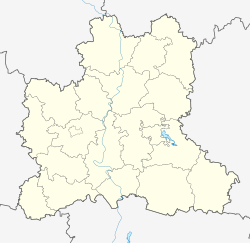Lipetsk, Russia
| Lipetsk (in English) Липецк (Russian) |
|
|---|---|
| - City - | |
 In Lipetsk |
|
 Location of Lipetsk Oblast in Russia |
|
|
|
|
|
|
|
|
|
|
| Anthem | none |
| City Day | Third Sunday in July |
| Administrative status (as of December 2014) | |
| Country | Russia |
| Federal subject | Lipetsk Oblast |
| Administratively subordinated to | Lipetsk City Under Oblast Jurisdiction |
| Administrative center of | Lipetsk Oblast,Lipetsky District, Lipetsk City Under Oblast Jurisdiction |
| Municipal status (as of December 2014) | |
| Urban okrug | Lipetsk Urban Okrug |
| Administrative center of | Lipetsk Urban Okrug, Lipetsky Municipal District |
| Head | Sergey Ivanov |
| Representative body | Council of Deputies |
| Statistics | |
| Population (2010 Census) | 508,887 inhabitants |
| - Rank in 2010 | 36th |
| Population (January 2014 est.) | 509,719 inhabitants |
| Time zone | MSK (UTC+03:00) |
| Founded | 1703 |
| City status since | September 27, 1779 |
| Postal code(s) | 398000–398002, 398004–398007, 398011, 398013–398017, 398019, 398020, 398024–398027, 328029, 328032, 328035–328038, 328040–328043, 328046, 328048, 328050, 328054–328056, 328058, 328059, 328070, 328700, 328899, 328910, 328999 |
| Dialing code(s) | +7 4742 |
|
|
|
| on | |
| 2010 Census | 508,887 |
|---|---|
| 2002 Census | 506,114 |
| 1989 Census | 449,635 |
| 1979 Census | 395,638 |
Lipetsk (Russian: Липецк; IPA: [ˈlʲipʲɪtsk]) is a city and the administrative center of Lipetsk Oblast, Russia, located on the banks of the Voronezh River in the Don basin, 438 kilometers (272 mi) southeast of Moscow. As of the 2010 Census, its population was 508,887.
Lipetsk was first mentioned in the 13th century chronicles. The name means "Linden city" and is cognate with Leipzig and Liepāja. In 1284, the city was destroyed by the Mongols.
The foundation of the modern city dates back to 1703, when Peter the Great ordered construction of a cast iron factory in Lipetsk near the iron ore deposits for making artillery shells. On September 27, 1779, Lipetsk was granted town status. It became one of the principal towns of Tambov Governorate.
In 1879, Lipetsk hosted a congress of members of Land and Liberty.
In the mid-1920s, the much-reduced German Army (Reichswehr) of the Weimar Republic secretly contracted with Soviet authorities to operate a clandestine military aviation base and test facility near Lipetsk – circumventing prohibitions of the Versailles Treaty. The base enabled technical collaboration by the two powers whose separate defeats in World War I left them isolated in post-war Europe. This activity inside the U.S.S.R. took place away from the vigilant eyes of the victors.
...
Wikipedia



